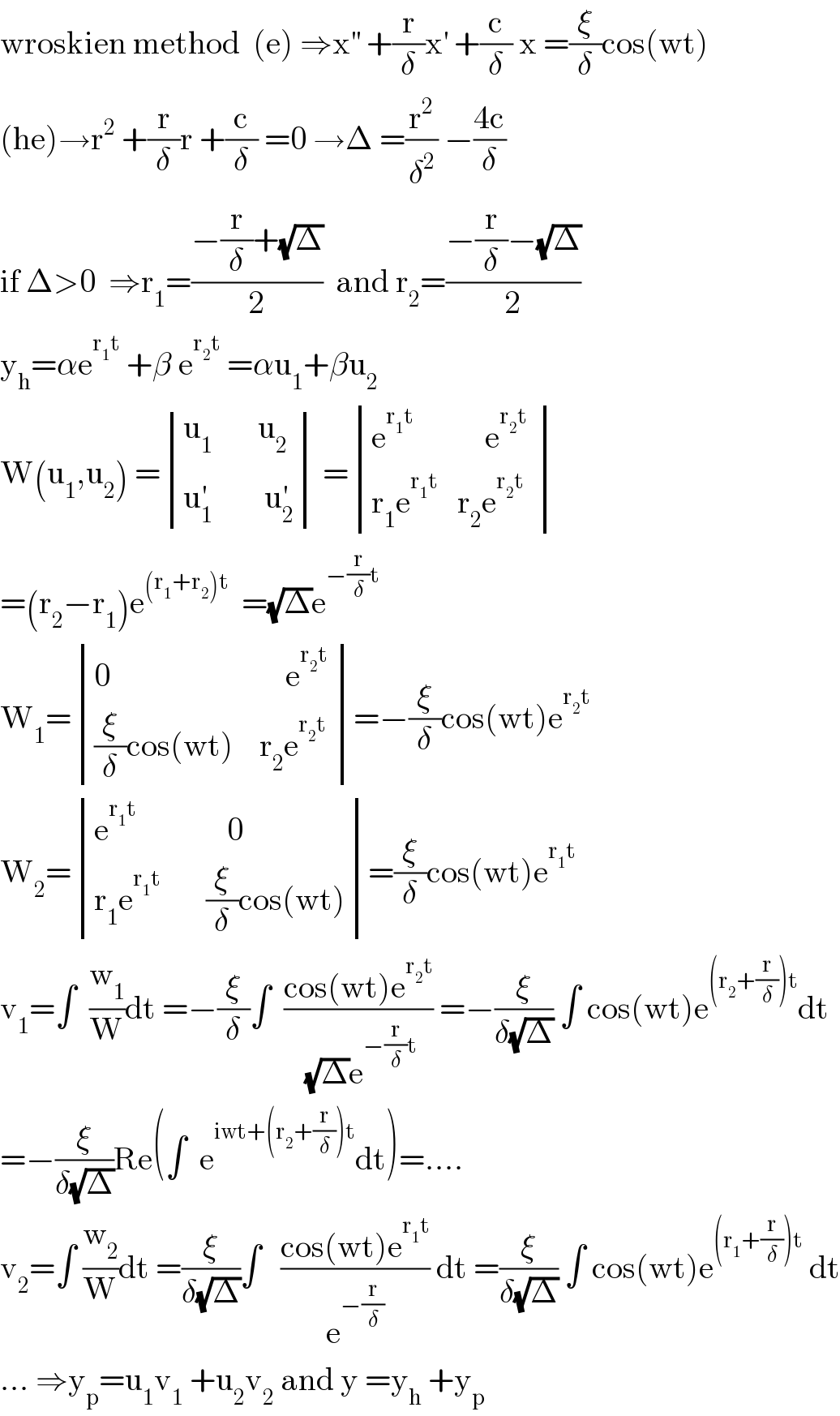Question Number 95600 by Tony Lin last updated on 26/May/20

Answered by mathmax by abdo last updated on 26/May/20
![we take q=x and L =δ so (e)⇒δx^(′′) +r x^′ +cx =ξcos(wt) (c=(1/C)) let solve by laplace transform ⇒ δL(x^(′′) )+rL(x^′ )+cL(x) =ξL(cos(wt)) ⇒ δ(t^2 L(x)−tx(0)−x^′ (0))+r(tL(x)−x(0))+cL(x) =ξL(cos(wt)) ⇒ (δt^2 +rt +c)L(x)−δt x(0)−δx^′ (0)−rx(0) =ξL(cos(wt) L(cos(wt) =∫_0 ^∞ cos(wu)e^(−tu) du =Re(∫_0 ^∞ e^(iwu−tu) du) but ∫_0 ^∞ e^((iw−t)u) du =[(1/(iw−t)) e^((−t+iw)u) ]_0 ^∞ =−(1/(iw−t)) =(1/(t−iw)) =((t+iw)/(t^2 +w^2 )) ⇒L(cos(wt)) =(t/(t^2 +w^2 )) ⇒ (δt^2 +rt +c)L(x) =((ξt)/(t^2 +w^2 )) +(δt +r)x(0)+δx^′ (0) ⇒ L(x) =((ξt)/((t^2 +w^2 )(δt^2 +rt +c))) +((δt +r)/(δt^2 +rt +c))x(0) +((δx^′ (0))/(δt^2 +rt +c)) ⇒ x(t) =ξL^(−1) ((1/((t^2 +w^2 )(δt^2 +rt +c)))) +L^(−1) (((δt +r)/(δt^2 +rt +c))x(0)) +L^(−1) ( ((δx^′ (0))/(δt^2 +rt +c))) δt^2 +rt +c =0→Δ =r^2 −4δc if Δ>0 ⇒t_1 =((−r +(√(r^2 −4δc)))/(2δ)) and t_2 =((−r−(√(r^2 −4δc)))/(2δ)) ⇒ ((δx^′ (0))/(δt^2 +rt +c)) =((x^′ (0))/((t−t_1 )(t−t_2 ))) =δ((x^′ (0))/( (√(r^2 −4δc))))((1/(t−t_1 ))−(1/(t−t_2 ))) ⇒ L^(−1) (....) =((δx^′ (0))/( (√(r^2 −4δc)))){ L^(−1) ((1/(t−t_1 )))−L^(−1) ((1/(t−t_2 )))} =((δx^′ (0))/( (√(r^2 −4δc)))){e^(t_1 t) −e^(t_2 t) }...be continued....](https://www.tinkutara.com/question/Q95623.png)
Commented by mathmax by abdo last updated on 26/May/20

Commented by Tony Lin last updated on 26/May/20

Commented by mathmax by abdo last updated on 27/May/20

